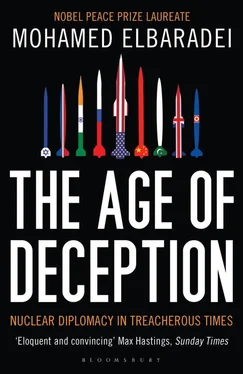Not everyone in Washington was pleased that I had gone to Libya immediately after the Bush-Blair announcement. They wanted to be sure that the credit for discovering Libya’s clandestine program and for the negotiations with Gaddafi remained exclusively theirs. To me, credit was beside the point. From my perspective, the governments of the United Kingdom and the United States had failed in their obligation to inform the IAEA about Libya’s secret nuclear activities. But now that the Agency had the information, it was our legal obligation to follow up.
On January 2, 2004, the New York Times ran a story quoting Shukri Ghanim, the Libyan prime minister, urging the United States to hold up its end of the deal—essentially, to lift long-standing sanctions that, among other things, had forbidden U.S. oil companies to work with Libya and frozen $1 billion in Libyan assets. [4] “Libya Presses UN to Move Quickly to End Sanctions,” New York Times , January 2, 2004.
Ghanim also made clear that he considered the IAEA to be in charge of Libya’s nuclear disarmament process.
Ghanim’s remark, coming right after my visit, clearly struck a nerve. The article also quoted an unnamed “senior Bush administration official” referring to my trip as essentially a “badly advised” publicity stunt. The same official indicated that British and American intelligence officers and nuclear experts would “effectively take charge of the disarmament.” The fact that the IAEA has the sole legal jurisdiction to verify nuclear activities in countries party to the NPT seemed not to have entered their calculations.
The Americans were also unhappy that I had characterized the Libyan nuclear program, at first glance, as nascent. The intelligence coup would have seemed more significant had Libya’s program been larger or closer to producing a nuclear weapon. In any case, my assessment was confirmed as the IAEA inspection team returned to verify the program exhaustively in the ensuing weeks and months.
A good example was Libya’s Uranium Conversion Facility at Salah Eddin. Libyan scientists, as it turned out, had worked on lab-scale and bench-scale uranium conversion activities since the 1980s, with the support of a foreign scientist. In 1984, Libya ordered from abroad a pilot-scale uranium conversion facility, in the form of portable components. The components were received in 1986, then stored in various locations around Tripoli until 1998, when they were partially assembled and moved to a site called Al-Khalla. In February 2002, Libyan scientists had begun cold-testing; but two months later, because of concern over a possible security breach, they dismantled the facility, packed everything up, and moved it all to its current location at Salah Eddin.
So how extensive were the uranium conversion capabilities at Salah Eddin? As our sample analyses would confirm, Libya had never actually used uranium at the facility. The pilot plant had very small capacity and no ability to produce uranium hexafluoride gas, the feedstock for uranium enrichment. Even on a laboratory scale, Libyan scientists had never produced UF 6domestically.
Similar limitations in scope, capacity, and know-how were characteristic of other parts of the Libyan nuclear fuel cycle. They had essentially no mining or milling operations. Their enrichment capacity, as I have noted, was limited to a small number of centrifuges with no production or even testing of nuclear material. They had procured precision machine shop equipment for domestic centrifuge manufacture, but the parts were still in their shipping crates. In their research reactor at Tajura, they had irradiated a few dozen uranium targets, mostly sized at about one gram, and from two of the targets separated a miniscule amount of plutonium. They had done no work on nuclear weaponization. They had received drawings of nuclear weapons designs, but the drawings had stayed in their shopping bags, locked in Matouq’s safe. [5] To our relief, the IAEA’s weapon experts determined that these weapon designs were missing important parts. A. Q. Khan was not a weapon designer, and he most likely passed to Libya whatever he was able to get hold of in Pakistan.
While our inspections were still in progress, Reuters and other news outlets soon began running stories that U.S. and U.K. experts were about to fly to Tripoli to begin removing the nuclear equipment from Libya. I immediately rang up Peter Jenkins, British ambassador to the IAEA. If this were to happen before the Agency completed its work, I told him, I would convene a special session of the IAEA Board. “Please inform your government,” I said, “that I will report to the Board that I am no longer in a position to perform my responsibilities under the NPT because of interference by the British and the Americans.” I was tired of playing games. If necessary, I would go public on the issue. If the United States and the United Kingdom were determined to circumvent the role and responsibilities of multilateral institutions, I would not remain silent.
A few days later, Colin Powell called to say he was sending Bolton and his British counterpart, William Ehrman, to Vienna to discuss with me modes of cooperation in Libya. “We need to respect your assets,” Powell said, referring to the Agency’s expertise and areas of jurisdiction. “And of course, we have our assets.”
“I understand,” I replied, “but I have a trust that is given to me by IAEA Member States, and I cannot give it away.”
Powell did not press the point. “I had meetings with Bolton last night and this morning,” he said, “and he is very much looking forward to coming to see you.”
I had my doubts about the last part. I had met Bolton once before, shortly after he assumed office, in 2001, as undersecretary of state for arms control and international security. We had agreed to work together on nonproliferation and other arms control issues. “I’m going to have to act in many ways contrary to my own writing,” he had said jokingly, alluding, I assumed, to his derisive comments about the United Nations. [6] I believe Bolton was referring to statements such as declaring to a panel of the World Federalist Association, in 1994, “There is no such thing as the United Nations.” Bolton had gone on to say, “The Secretariat Building in New York has thirty-eight stories. If you lost ten stories today, it wouldn’t make a bit of difference.” Quoted in “Bolton: An Unforgivable Choice as UN Ambassador,” Council on Hemispheric Affairs, March 10, 2005, retrieved at www.scoop.co.nz/stories/WO0503/S00185.htm .
That was about the extent of his support for the work of the IAEA. But Powell’s implicit message was reassuring: Bolton was being sent under explicit instructions not to create problems.
And in fact, in this instance, our interaction was without incident. Our meeting, which took place on January 19, 2004, was staged as a technical briefing at the permanent mission of the U.S., less than a block from IAEA headquarters. Bolton was civil; we shook hands and got right to business. To his credit, Bolton was focused on reaching an agreement, and I made it clear from the outset that I would not waver on the Agency’s role. We agreed that the Agency needed to finish its job first—measurements, sampling, and other verification measures—and that only once we were done could the United States and the United Kingdom remove the equipment out of the country, in accordance with their agreement with Libya.
The meeting ended on an ostensibly friendly note, much to the relief of William Ehrman, who apparently had been anticipating a clash. Our agreement also worked well in practice: things went smoothly on the ground between the IAEA inspectors and the American and British experts.
The path was eased by the Libyans’ full and consistent cooperation. Their readiness to provide information and access made the technical verification work refreshingly straightforward for the IAEA inspectors. Matouq came periodically to Vienna to see me, to ensure that inspections were going according to plan and to resolve any outstanding questions. It was a refreshing change from our experiences in Iraq, North Korea, and Iran. By the end of January, Agency inspectors had completed a major portion of the most sensitive nuclear verification work, and soon thereafter, a large assembly of nuclear fuel cycle equipment was dismantled and, in accordance with the Libyan-American agreement, shipped to the United States.
Читать дальше












